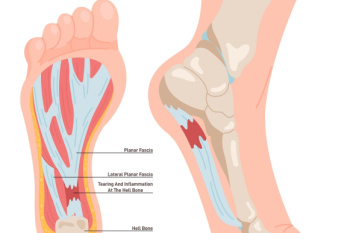Items filtered by date: May 2025
Definition and Risk Factors of Chronic Plantar Fasciitis

Chronic plantar fasciitis occurs when the plantar fascia, the thick band of tissue along the bottom of the foot, remains inflamed for longer than six months. It typically causes persistent heel pain, especially with the first steps in the morning or after long periods of rest. Diagnosis involves a physical examination where a podiatrist checks for tenderness along the heel and arch, as well as assessing range of motion and foot structure. Imaging tests like ultrasounds or MRI scans may be used to rule out other conditions. Risk factors include having flat feet or high arches, obesity, occupations that require prolonged standing, and repetitive impact activities like running. Plantar fasciitis can be painful and may cause difficulty in completing daily activities. If you have this condition, it is suggested that you are under the care of a podiatrist who can offer effective treatment solutions.
Plantar fasciitis can be very painful and inconvenient. If you are experiencing heel pain or symptoms of plantar fasciitis, contact Dr. Odin De Los Reyes from Connecticut. Our doctor can provide the care you need to keep you pain-free and on your feet.
What Is Plantar Fasciitis?
Plantar fasciitis is the inflammation of the thick band of tissue that runs along the bottom of your foot, known as the plantar fascia, and causes mild to severe heel pain.
What Causes Plantar Fasciitis?
- Excessive running
- Non-supportive shoes
- Overpronation
- Repeated stretching and tearing of the plantar fascia
How Can It Be Treated?
- Conservative measures – anti-inflammatories, ice packs, stretching exercises, physical therapy, orthotic devices
- Shockwave therapy – sound waves are sent to the affected area to facilitate healing and are usually used for chronic cases of plantar fasciitis
- Surgery – usually only used as a last resort when all else fails. The plantar fascia can be surgically detached from the heel
While very treatable, plantar fasciitis is definitely not something that should be ignored. Especially in severe cases, speaking to your doctor right away is highly recommended to avoid complications and severe heel pain. Your podiatrist can work with you to provide the appropriate treatment options tailored to your condition.
If you have any questions please feel free to contact our offices located in Southbury and Farmington, CT . We offer the newest diagnostic and treatment technologies for all your foot and ankle needs.
